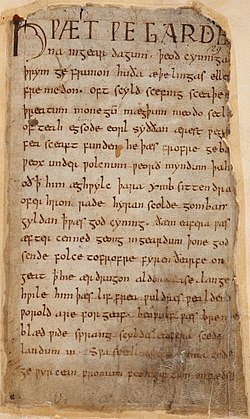Beowulf
| Beowulf | |
|---|---|

First page of Beowulf in Cotton Vitellius A. xv
|
|
| Author(s) | Unknown |
| Language | West Saxon dialect of Old English |
| Date | c. 700–1000 AD (date of poem), c. 975–1010 AD (date of manuscript) |
| State of existence | Manuscript suffered damage from fire in 1731 |
| Manuscript(s) | Cotton Vitellius A. xv |
| First printed edition | Thorkelin (1815) |
| Genre | Epic heroic poetry |
| Verse form | Alliterative verse |
| Length | c. 3182 lines |
| Subject | The battles of Beowulf, the Geatish hero, in youth and old age |
| Personages | Beowulf, Hygelac, Hrothgar, Wealhþeow, Hrothulf, Æschere, Unferth, Grendel, Grendel's mother, Wiglaf, Hildeburh. |
Beowulf (/ˈbeɪoʊwʊlf, ˈbiːoʊ-/;Old English: [ˈbeːo̯ˌwulf]) is an Old English epic poem consisting of 3182 alliterative lines. It may be the oldest surviving long poem in Old English and is commonly cited as one of the most important works of Old English literature. A date of composition is a matter of contention among scholars; the only certain dating pertains to the manuscript, which was produced between 975 and 1025. The author was an anonymous Anglo-Saxon poet, referred to by scholars as the "Beowulf poet".
The poem is set in Scandinavia. Beowulf, a hero of the Geats, comes to the aid of Hrothgar, the king of the Danes, whose mead hall in Heorot has been under attack by a monster known as Grendel. After Beowulf slays him, Grendel's mother attacks the hall and is then also defeated. Victorious, Beowulf goes home to Geatland (Götaland in modern Sweden) and later becomes king of the Geats. After a period of fifty years has passed, Beowulf defeats a dragon, but is fatally wounded in the battle. After his death, his attendants cremate his body and erect a tower on a headland in his memory.
...
Wikipedia
